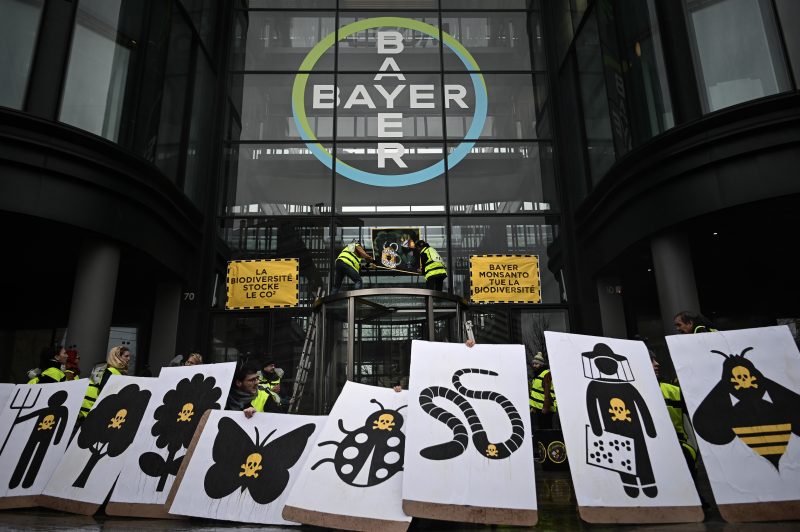Bayer admits Monsanto may have other ‘watch lists’
(FILES) In this file photo taken on March 14, 2019, activists stage a flash protest organised by the international movement Attac at the offices of Bayer – which recently acquired Monsanto – in La Garenne Colombes near the financial district of La Defense on the outskirts of Paris.Germany’s Bayer apologised on May 12, 2019 after revelations in France that its subsidiary Monsanto had a PR agency collate lists of politicians, scientists and journalists and their views on pesticides and GM crops. (Philippe LOPEZ)
Berlin (AFP) – German chemical giants Bayer admitted Monday its subsidiary Monsanto could have kept lists of key figures — for or against pesticides — “in other European countries”, and not just in France.
Bayer apologised Sunday after it emerged that Monsanto had a PR agency collate lists of French politicians, scientists and journalists, with their views on pesticides and GM crops.
“I think it’s very likely that such lists also exist in other European countries,” Matthias Berninger, Bayer’s head of Public Affairs, told journalists in a conference call.
Berninger said he “firmly believes that other countries in Europe will be affected.
“It is clear that we apologise for what has come to light in France,” he added.
“We consider what we have seen so far to be completely inappropriate. Of course, we were not able to see everything.
“However, we were of the opinion that the reports of these dealings with journalists, politicians and activists are not in order and not in agreement with what Bayer stands for.”
The German agro-chemicals and drugs giant finalised the acquisition of the US company Monsanto last year for $63 billion.
But the deal has turned out to be plagued with other massive costs.
Just two months after the acquisition was completed, Monsanto lost a case to a school groundskeeper suffering from terminal non-Hodgkin’s lymphoma. He had sued the company over the glyphosate weedkillers Roundup and Ranger Pro.
Monsanto was initially ordered to pay $289 million to Johnson, before the damages were reduced to $78.5 million.
In March, the company lost another case to an American retiree who blames his cancer on the weedkiller, and was ordered by a court to pay $80 million to the plaintiff.
Bayer announced last month that more than 13,000 lawsuits related to the weedkiller had been launched in the US.
French authorities have opened a preliminary enquiry into claims Monsanto had information illegally collected on the views and pliability of hundreds of high-profile figures and media outlets.
Monsanto allegedly had public relations agency FleishmanHillard draw up files on their opinions on the controversial weedkiller glyphosate and on genetically modified crops.
On Sunday, Bayer said it had pledged to ask a law firm to evaluate the allegations, to fully inform all the persons involved, and to “fully support” the French public prosecutor’s office.
The story broke last Thursday after revelations in a programme broadcast by the France 2 television channel.
Paris police said it would carry out the probe following a complaint by the daily Le Monde and one of its journalists, whose names appear on the list, the Paris prosecutor’s office said.
Two anti-pesticide NGOs, Foodwatch and Generations Futures, and two French research institutes, the CNRS and INRA, were also preparing to lodge legal complaints.
Disclaimer: Validity of the above story is for 7 Days from original date of publishing. Source: AFP.


